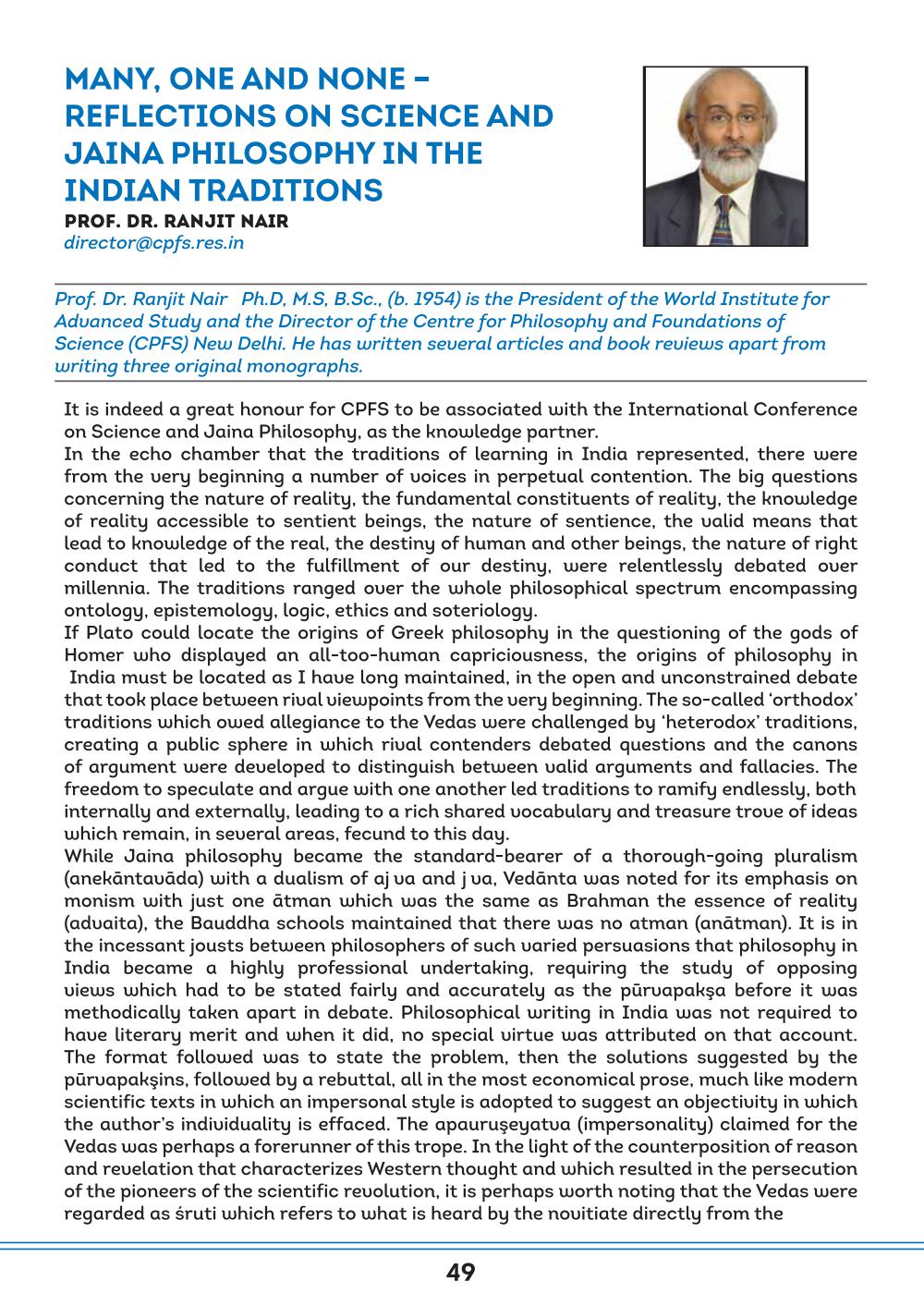________________
MANY, ONE AND NONE - REFLECTIONS ON SCIENCE AND JAINA PHILOSOPHY IN THE INDIAN TRADITIONS PROF. DR. RANJIT NAIR
[email protected]
Prof. Dr. Ranjit Nair Ph.D, M.S, B.Sc., (b. 1954) is the President of the World Institute for Advanced Study and the Director of the Centre for Philosophy and Foundations of Science (CPFS) New Delhi. He has written several articles and book reviews apart from writing three original monographs.
It is indeed a great honour for CPFS to be associated with the International Conference on Science and Jaina Philosophy, as the knowledge partner. In the echo chamber that the traditions of learning in India represented, there were from the very beginning a number of voices in perpetual contention. The big questions concerning the nature of reality, the fundamental constituents of reality, the knowledge of reality accessible to sentient beings, the nature of sentience, the valid means that lead to knowledge of the real, the destiny of human and other beings, the nature of right conduct that led to the fulfillment of our destiny, were relentlessly debated over millennia. The traditions ranged over the whole philosophical spectrum encompassing ontology, epistemology, logic, ethics and soteriology. If Plato could locate the origins of Greek philosophy in the questioning of the gods of Homer who displayed an all-too-human capriciousness, the origins of philosophy in
India must be located as I have long maintained, in the open and unconstrained debate that took place between rival viewpoints from the very beginning. The so-called 'orthodox traditions which owed allegiance to the Vedas were challenged by 'heterodox' traditions, creating a public sphere in which rival contenders debated questions and the canons of argument were developed to distinguish between valid arguments and fallacies. The freedom to speculate and argue with one another led traditions to ramify endlessly, both internally and externally, leading to a rich shared vocabulary and treasure trove of ideas which remain, in several areas, fecund to this day. While Jaina philosophy became the standard-bearer of a thorough-going pluralism (anekāntavāda) with a dualism of aj ua and jua, Vedānta was noted for its emphasis on monism with just one ātman which was the same as Brahman the essence of reality (advaita), the Bauddha schools maintained that there was no atman (anātman). It is in the incessant jousts between philosophers of such varied persuasions that philosophy in India became a highly professional undertaking, requiring the study of opposing views which had to be stated fairly and accurately as the pūrvapaksa before it was methodically taken apart in debate. Philosophical writing in India was not required to have literary merit and when it did, no special virtue was attributed on that account. The format followed was to state the problem, then the solutions suggested by the pūruapakşins, followed by a rebuttal, all in the most economical prose, much like modern scientific texts in which an impersonal style is adopted to suggest an objectivity in which the author's individuality is effaced. The apauruşeyatua (impersonality) claimed for the Vedas was perhaps a forerunner of this trope. In the light of the counterposition of reason and revelation that characterizes Western thought and which resulted in the persecution of the pioneers of the scientific revolution, it is perhaps worth noting that the Vedas were regarded as śruti which refers to what is heard by the nouitiate directly from the
49




